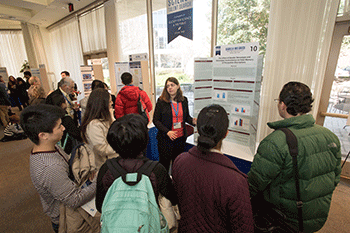People tend to tune out details of ‘female’ jobs
A New York City teen shows people remember less about nursing and other jobs that are typically performed by women

People remember more from a story about a male-associated job — like a pilot — even if a women is doing it, a teen finds.
ViewApart/istockphoto
WASHINGTON, D.C. — “Women’s” careers don’t seem as memorable as those traditionally performed by men. That may not be fair, but it’s what the data show, according to a new survey. It was carried out by Isabella Greco, 17, of the Bronx High School of Science in New York City.
Stereotypes are beliefs that people hold — before they have enough information to know whether they are true. This teen was interested in probing stereotypes about women. “I had a personal connection,” Isabella notes. “It was something I saw all around me, the effect of gender stereotypes.”
For instance, Isabella noticed that people might assume her math teacher was a man and her English teacher a woman. Why? Although both men and women hold such jobs, she knew there was a common stereotype that women are more interested in reading, and that men are more likely to be comfortable with math. The teen wondered whether those assumptions might affect what people remember about them.
It turns out that it does, she reports.
Her new study landed the teen a spot as a finalist, here, last week at the Regeneron Science Talent Search. Run by Society for Science & the Public (SSP), this yearly competition brings together 40 high school seniors from around the country to share their projects with the public. They also compete for nearly $2 million in prizes. The Science Talent Search is sponsored by Regeneron, a company that researches and develops new medications. (SSP also publishes Science News for Students and this blog.)
From cows to people
Isabella started out her career in research studying animals. In middle school, for instance, she studied which direction cows preferred to face. Then she tried to find out if pigeons could identify the people who fed them. Neither project worked very well, she recalls. But Isabella came to realize that “I really liked the experience of observing behavior.” By the time she entered high school, she was ready to turn her attention to studying people.
She got in touch with Mitchell Rabinowitz at Fordham University in New York City. He’s a psychologist — someone who studies how people behave. When Isabella explained her interest in probing stereotypes, he invited her to work with his laboratory.
She decided to explore whether gender stereotypes might affect memories. To do that, she designed a survey. It asked participants to read the biographies of six people. They were a nurse, elementary school teacher, pilot, electrical engineer, accountant and public relations executive. The stories described the people and their accomplishments. But Isabella mixed up their stories. Sometimes a woman might have been the pilot — or one of those other careers — and sometimes it was a man.

She chose this mix of careers because the first two are dominated by women and the next two by men. The last two employ roughly equal numbers of men and women, so Isabella assumed there would be no gender stereotype.
She sent her survey to 138 people on Amazon’s Mechanical Turk. This is a website scientists often use to pay people to take surveys. Half of her recruits were men, half women. After they read their assigned stories, the teen gave the participants a short task to distract them. Later, the teen gave each person a series of statements about the stories that he or she had read. Only some were true. The participants had to state whether or not each statement was “true to the biography.”
When the stories involved people in stereotypical women’s careers — the nurse and the school teacher — people tended to remember less about them than if they were about stereotypically male careers or neutral jobs, Isabella found. This was true even if the person in the story had been a man. “It might just be because people didn’t show as much interest in the feminine-associated occupations,” the teen now says. “They weren’t paying as much attention so their memories might be warped.”
Some of the false statements downplayed a person’s achievements. And the participants were more likely to believe those false statements when they were associated with people working in those so-called feminine jobs. “I think it might be because of implicit bias [an unconscious prejudice] against feminine-associated occupations,” Isabella explains. People might view jobs associated with women as having less value.
The teen hopes her work might help people understand the U.S. wage gap — the fact that women earn less than men. “Women in jobs that are dominated by women [like nursing and teaching] receive lower pay,” she explains. Other scientists have shown that this is because the jobs themselves are valued less. Her new data seem to support that, Isabella says. But to be more certain, she plans to do follow-up research.
Follow Eureka! Lab on Twitter







